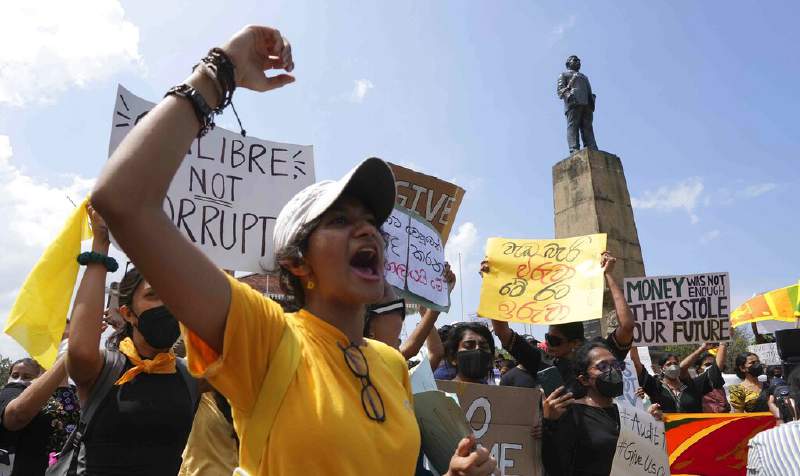
FILE – Sri Lankans protest demanding president Gotabaya Rajapaksa resign in Colombo, Sri Lanka, Monday, April 4, 2022. Sri Lanka’s president on Monday invited all political parties represented in Parliament to accept ministries after his Cabinet resigned amid public protests over the country’s worst economic crisis. Disruptions to supplies of commodities, financial strains and higher prices are among the shocks from the war in Ukraine that will slow economies in Asia in coming months, the World Bank says in a report released Tuesday, April 5, 2022.
13:18 JST, April 5, 2022
BANGKOK (AP) — Disruptions to supplies of commodities, financial strains and higher prices are among the impacts of the war in Ukraine that will slow economies in Asia in coming months, the World Bank says in a report released Tuesday.
The report forecasts slower growth and rising poverty in the Asia-Pacific region this year as “multiple shocks” compound troubles for people and for businesses.
Growth for the region is estimated at 5%, down from the original forecast of 5.4%. The “low case” scenario foresees growth dipping to 4%, it said. The region saw a rebound to 7.2% growth in 2021 after many economies experienced downturns with the onset of the pandemic.
The World Bank anticipates that China, the region’s largest economy, will expand at a 5% annual pace, much slower than the 8.1% growth of 2021.
Russia’s invasion of Ukraine has helped drive up prices for oil, gas and other commodities, eating into household purchasing power and burdening businesses and governments that already are contending with unusually high levels of debt due to the pandemic, the report said.
The development lending institution urged governments to lift restrictions on trade and services to take advantage of more opportunities for trade and to end fossil fuel subsidies to encourage adoption of more green energy technologies.
“The succession of shocks means that the growing economic pain of the people will have to face the shrinking financial capacity of their governments,” said the World Bank’s East Asia and Pacific Chief Economist Aaditya Mattoo. “A combination of fiscal, financial and trade reforms could mitigate risks, revive growth and reduce poverty.”
The report pointed to three main potential shocks for the region: the war, changing monetary policy in the U.S. and some other countries and a slowdown in China.
While rising interest rates make sense for cooling the U.S. economy and curbing inflation, much of Asia lags behind in its recovery from the pandemic. Countries like Malaysia may suffer outflows of currency and other financial repercussions from those changing policies, it said.
Meanwhile, China’s already slowing economy could falter as outbreaks of COVID-19 provoke lockdowns like the one now in place in Shanghai, the country’s biggest megacity. That is likely to affect many Asian countries whose trade relies on demand from China.
“These shocks are likely to magnify existing post-COVID difficulties,” the report said. The 8 million households whose members fell back into poverty during the pandemic, “will see real incomes shrink even further as prices soar.”
The report noted that regional economies fared better during the 2021 Delta variant waves of coronavirus than in the initial months of the pandemic in 2020, largely because fewer restrictions were imposed and widespread vaccinations helped limit the severity of the outbreaks.
On average, countries with a 1 percentage point higher vaccination rate had higher growth, it said.
Top Articles in News Services
-

Arctic Sees Unprecedented Heat as Climate Impacts Cascade
-

Prudential Life Expected to Face Inspection over Fraud
-

South Korea Prosecutor Seeks Death Penalty for Ex-President Yoon over Martial Law (Update)
-

Trump Names Former Federal Reserve Governor Warsh as the Next Fed Chair, Replacing Powell
-

Japan’s Nagasaki, Okinawa Make N.Y. Times’ 52 Places to Go in 2026
JN ACCESS RANKING
-

Univ. in Japan, Tokyo-Based Startup to Develop Satellite for Disaster Prevention Measures, Bears
-

JAL, ANA Cancel Flights During 3-day Holiday Weekend due to Blizzard
-

China Confirmed to Be Operating Drilling Vessel Near Japan-China Median Line
-

China Eyes Rare Earth Foothold in Malaysia to Maintain Dominance, Counter Japan, U.S.
-

Japan, Qatar Ministers Agree on Need for Stable Energy Supplies; Motegi, Qatari Prime Minister Al-Thani Affirm Commitment to Cooperation


























